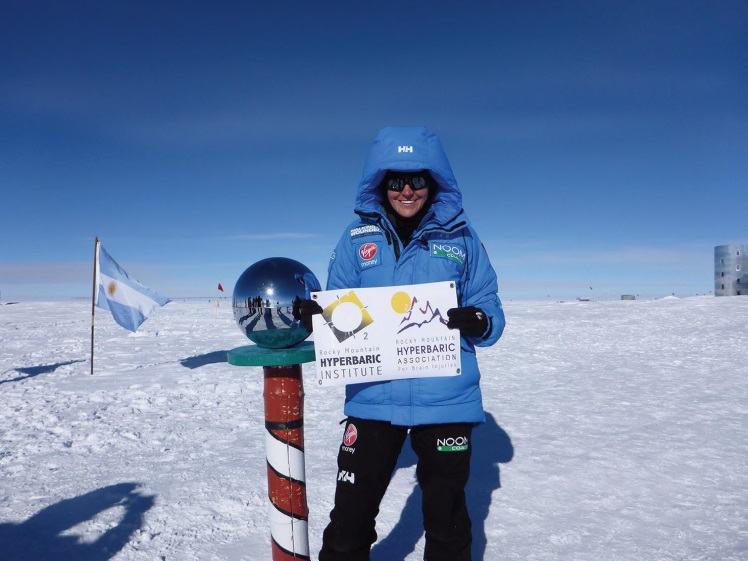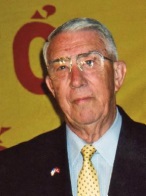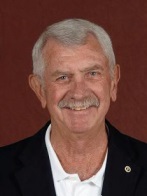
POLE POSITION: Margaux arrives at the South Pole with the Rocky Mountain Hyperbaric Institute logo; Her performance in that grueling race set a new level of fortitude that this young combat veteran consistently demonstrates in her life.
did not want anything to be about me. I wanted to understand how he had been suffering, and I wanted to be able to help. And I enjoyed every minute of helping him! I was sweating because it was very hot, but it felt so good to work
and struggle and do this for Ivan."
Margaux met the prince and all the international participants in England, where they were wined and dined before flying out to New Zealand. They then sailed off to the race site in
Antarctica. Their arctic trek was filmed from the beginning, and it was apparent that Prince Harry was out to win it all for his team. Camera operators accompanying the racers had as much difficulty with the rugged, inhospitable terrain as the racers did. Harry had managed a considerable lead over the other two teams within the first few days. It became apparent, however, that something was very wrong. Filming revealed that the American team was falling behind by quite a distance. When Prince Harry realized it was due to the team's challenges to assist their blind team member, he decided that all three teams would race together, and Margaux and her friends would get help with their handicapped racer.
Everyone at the Rocky Mountain clinic admires Margaux for her exceptional humility and spirit. Eddie and Ryan were incredibly proud when she displayed the Rocky Mountain Hyperbaric Institute and Rocky Mountain Hyperbaric Association for Brain Injuries banners at the pole. Margaux's performance and gutty grit in that grueling race set a new level of fortitude and courage that this lovely, young combat veteran consistently demonstrates in her life. •
ABOUT THE AUTHORS

Bob Fischer is a 1955 Naval Academy graduate and career Marine Corps officer who retired in 1982. He was Captain of Marines on the U.S.S. Saint Paul CA73, the 7th Fleet Flagship, from 1961 to 1963, when he studied four guerrilla wars in Southeast Asia and obtained the Malaya Jungle School Syllabus at Johore Bahru. He used the syllabus to establish the 2nd Marine Division Counter-guerrilla Warfare Center at Camp Lejeune, North Carolina. 20,000 Marines, Navy Seal, and Special Forces Teams were also trained there. His CIPA award-winning book Guerrilla Grunt documents this experience. He was also a task force advisor (Covan) for the Vietnamese Marine Corps from 1966 to 1968 and wrote his book Covan about this experience. From 1977-to 80, as Commander of the Defense Electronics Depot, Kettering, Ohio, his workforce set the Defense Logistics Agency's all-time performance record. For this, he was awarded the Defense Superior Service Medal. In 2010, he attended a presentation by the Rocky Mountain Hyperbaric Institute and its nonprofit Rocky Mountain Hyperbaric Association for Brain Injuries, where he learned about their recently established Healing Our Heroes fund. His involvement with other Marine veteran organizations motivated him to become a Veteran's Advocate for the clinic. Joining Grady Birdsong, they filmed the first veterans who received hyperbaric oxygen therapy (HBOT) in the original Boulder clinic and raised funds by presenting the unique HBOT story to groups in the Denver area. He was named Colorado American Legion's Veteran Advocate of the Year for his efforts in 2012.

Grady T. Birdsong was raised in Kansas before enlisting in the United States Marine Corps in 1966. After serving two tours in the Northern "I-Corps" region of Vietnam during Tet of 1968 and the DMZ in 1969, he traveled the world, enjoying a successful career in engineering, business development, marketing, and technical sales in the telecommunications/data systems, information technology systems, and the optical and fiber systems test industries. Additionally, Grady is the author of A Fortunate Passage, To the Sound of the Guns, and Echoes of Our War, with nine EVVY awards from the Colorado Independent Publishers Association (CIPA). In 2010, Grady and Bob Fischer became Marine Corps Veteran Advocates for the Rocky Mountain Hyperbaric Institute, at a time when Ryan Fullmer and Eddie Gomez were struggling to establish their brand new HBOT clinic in the industrial area of Boulder, Colorado. His early filming of the clinic's first successful TBI-PTSD veteran's treatment generated the first significant donor funds, earning $135,000. These funds enabled the HBOT clinic to move to its current site in the Professional & Medical Center in Louisville, CO, and provide a nearby home for the forty-day treatment of out-of-town veterans. Now retired, Grady lives with his wife, Pamela, in the Denver area, where he enjoys his grandchildren and spends his time writing, volunteering, and hunting big game. Grady is a graduate of Regis University in Denver, Colorado. Both authors have an ongoing commitment to veterans of all wars and continue to advocate, inform, educate, and raise nonprofit funds. Both remain Semper Fidelis.